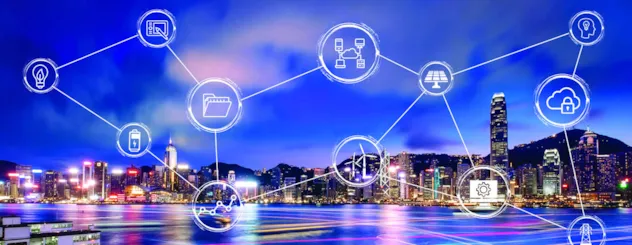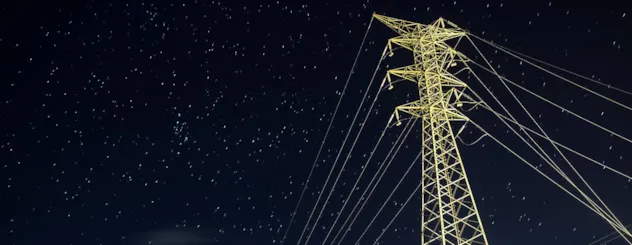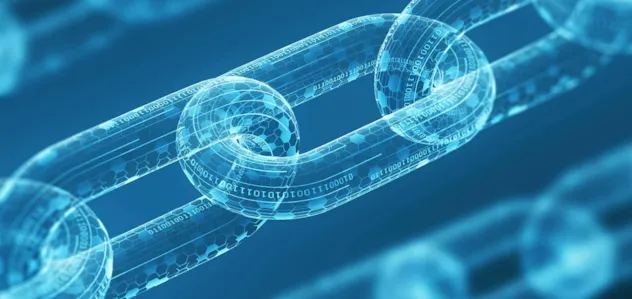May 10, 2018 | Podcast
Digitalization and the impact of new technologies
Transcript:
Transcript:
NARRATOR Welcome to the DNV Talks Energy podcast series. Electrification, rise of renewables and new technologies supported by more data and IT systems are transforming the power system. Join us each week as we discuss these changes with guests from around the industry.
Transcript:
MATHIAS STECK Welcome to a new episode of DNV Talks Energy here from the Global Smart Energy Summit in Dubai. My guest today is Brian Williams, Industry Advisor from SAP. Hi Bria
Transcript:
BRIAN WILLIAMS Good afternoon, nice to be here.
Transcript:
MATHIAS STECK Yes, thanks for making time for this. What we want to talk today about is SAP’s perspective on the impact of energy transition and digitalization on utilities, but before we get into this it would be great if you can tell us little bit more about yourself and your role in SAP.
Transcript:
BRIAN WILLIAMS Sure, yes. So, my accent, you’ll tell, is a bit of a mixed bag, I’m originally from South Africa, became an American and now I live in Dubai. My role at SAP is to cover the EMEA south region which is Southern Europe, the Middle East and Africa; and I focus on the energy, natural resources and utilities vertical industries as our customers embark on their digital transformation journeys.
Transcript:
MATHIAS STECK Right. So, we talked a bit earlier and you mentioned SAP’s clients are, among others, big utilities and they are challenged now by what I mentioned at the beginning, the energy transition, but also digitalization. So, what do you think, what can you bring for these utilities to the table in that challenging times?
Transcript:
BRIAN WILLIAMS Right. Yes it’s a continuum, if you will. Energy transition means different things to different people. For our European customers it’s driven by regulatory shifts that follow the public sentiment. In the Middle East we’re just beginning that journey with some regulatory changes but, you know, here it will look very different as we go through that journey. And then in Africa I would say the challenge there, in my opinion, mostly is outdated regulation. And so, you know, I think if you look, compare the different regions in which we’re operating, there are distinct drivers to how we need to respond to those customer environments, if you will. So, our message for Europe, as you can imagine, is going to be based on technology-driven high speed processing of meeting demand versus supply and the inclusion of renewables. In the Middle East the journey is the beginning of renewables into the mix, but it’s still very much focused on customer service; customer happiness, as we call, it in Dubai. And then in Africa it is, you know, it’s getting electricity to people for sometimes for the first time ever. So, we have a very dynamic region here in MEA-South where SAP is bringing its solutions to the bear.
Transcript:
MATHIAS STECK You mentioned a few technologies already; what I would like to discuss a little bit with you is, we have, of course, tremendous uptake of renewables happening right now and going forward over the next couple of decades. We see storage happening and then we see relatively fast uptake of electric vehicles which is all new to grids which were never really designed for it.
Transcript:
BRIAN WILLIAMS Correct, correct.
Transcript:
MATHIAS STECK So, I would like to have your perspective on these matters?
Transcript:
BRIAN WILLIAMS Yes, it’s a tremendously fast moving story for all participants, I think the one that strikes me is the equivalent investment now; roughly equivalent. But if you compare the Australian story right now, where storage is comparable to fast start turbines, that changes the game. Now, it will be a while before that’s comparable to fast start turbines in the Middle East, but I think that clearly establishes the trend. Likewise, with the renewable power, from PV or wind, especially PV, I think PV is the game changer. We’ll see that outcompete fossil even in the Middle East and sooner than people think.
And then likewise the challenge that EV poses to grids will happen, I think, faster than most folks are anticipating. Even in Dubai the objective is something like 20,000 vehicles by 2020, and that will already have a noticeable impact on the network. Each electric vehicle, depending on its consumption, is the equivalent of another household, or more. And I think the real change there will be, at least coming back to EV, will be on fleets. While there’s a really interesting story around the, you know, you and I driving our private cars; the game changing story for industry will be delivery vehicles and commercial vehicles.
So, from a SAP perspective I don’t think you’ll see us very strongly in the automotive space, in the EV market yet, but I think you will start seeing how we help our commercial customers and utilities optimize fleet vehicles, so, that would be the picture there.
Transcript:
MATHIAS STECK That’s an interesting thought, you just mentioned, you and me driving our own cars. One could predict that even that is going away, that’ll become to more like shared economy models and then of course the fleet thought, again, is quite interesting. Are you working on some areas like these now?
Transcript:
BRIAN WILLIAMS We do, yes. Yes we, in the European Union we are participating, actually no, specifically within Germany we’re participating in EV fleet trials. So, for example, Deutsche Post and others are, are trialing EV fleets. And the challenge there, as you can imagine, is if you’re Deutsche Post you need to optimize your energy consumption across your fixed holdings and your vehicle fleet. And so, how do you mitigate peak demand costs and the like. So, it becomes a matter of being very smart about when you charge your vehicles and where you charge your vehicles. And then from a network balancing perspective, we have the same issue for our utility providers, right? So, if you had a depot and everybody is charging their fleet vehicle overnight that would be potentially a stressful event for that local grid.
So, one of the big drivers for smart technologies is very simple, it comes down to cost. Our utility customers would rather spend money on technology than on copper, so, to the extent that you can avoid the large capital investments in building out the grid; all these other methods of anticipating demand and reacting to demand in a smart way, is where we see our role.
Transcript:
MATHIAS STECK Yes, that leads us over to another question I had in mind. Demand customers, moving more and more into the centre somehow, getting more powerful and companies need to react to this. So, what is this whole journey bringing us on customer satisfaction and also revenues for companies around customers?
Transcript:
BRIAN WILLIAMS Good question, so, you know, at the leading edge of that conversation is not good news, potentially, because I think the disintermediation of utility for the prosumer is a real possibility in some markets. If you have the regulatory sophistication to allow for that there’s no reason why blockchain technologies won’t be the brokering engine, if you will, between willing participants in their own energy trades. Now I don’t think that will be universally true, because I think the bulk of us, meaning us, you and I, live perhaps in apartments or in other types of housing that would make it hard for us to put up our own solar panels, or frankly, even care that much about being that engaged in these types of peer-to-peer markets. So, I think for many of us customer satisfaction then becomes key.
So, what do we value most? We value reliability and cost, and I don’t think those core fundamentals will change. And I am a little concerned that some of our utility customers, from a SAP perspective, are perhaps going a little bit too far in terms of home and behind the meter services. Now, you know, that makes some sense in those cases where it is a natural extension of the brand, for example, home heating, home comfort, but in some other areas, you know, home automation may be a bridge too far, or home entertainment,. The danger there is you may begin to dilute the core essential value of your brand, which is always going to be reliability and cost. So, that’s just an observation that I make as I look across our market space. But yes, customer satisfaction is going to be those essential two items.
Transcript:
MATHIAS STECK Right. You mentioned already two main anchors of the energy trilemma just now, it’s the reliability and affordability, so we add sustainability, but in these days linking back, as you’ve already mentioned about possibilities with blockchain, we get security as well. So, a lot more connection also means some risk in that area.
Transcript:
BRIAN WILLIAMS Right.
Transcript:
MATHIAS STECK Again, what would be your perspective on that matter?
Transcript:
BRIAN WILLIAMS Well I’ll talk about sustainability just for a minute. I think the path towards sustainability is firmly entrenched now, we’ll still see fossil of course endure for a while, because of its legacy position. But even in the Middle East I’m seeing folks really looking careful at where they make their next capital project investment for generation. And so, we will see even here a move to renewables. And for cost bases, you know, done on a cost argument, not on an environmental argument, and that’s really the point. So, environmentally friendly generation is going to stay, because it will be the most viable choice. In terms of security, that’s a challenging one, because the essential nature of blockchains and information technology in general is that it runs on a server somewhere, and where is that exactly? So, I share a recent experience with some home automation and only after I set it up did I realize that the servers were sitting in China, and that poses certain questions, right?
So, here I am living in Dubai, using European bought appliances that have a smart service that I can access from my Smartphone, that is delivered through a server sitting in China. That does make one think. So, you know, you could argue that integrity of message could be queried along the line by other parties. And so, I think we do need to address privacy concerns in the digital arena and take them quite seriously, because they will, unbeknownst to us, share to other actors whether we’re home or not, what our consumption patterns are and other privacy concerns. So, you’re right to be concerned.
Transcript:
MATHIAS STECK Yes, again, talking about you and me, I think we have become very used to our data being, kind of, shared, there are so many social sharing pages and so on and so forth, and there certainly we have less concern. But we definitely see, independent of countries, every country is very particular about taking the really important information in-country. So, it’s all in the cloud, but then it’s not.
Transcript:
MATHIAS STECK So, maybe a little bit on blockchain then. We talked a bit about security now, but, blockchain, the principle is obviously, it’s not only one computer, and we hear it a lot at the moment and our own company is doing stuff around this. I would be interested, number one, either, although you told me already, asking a technology company what they are doing is not a smart move, I still try, if you do something with blockchain and what you see as the biggest opportunity for blockchain in the energy sector.
Transcript:
BRIAN WILLIAMS Yes, it is an active area of research, so, I’ll put it like that. So, you know, we are ultimately looking at ways to monetize how the blockchain is going to serve practical use cases. So, for example we’ve mentioned some of the consumer use cases that have the blockchain as an intermediary for settlement. So, we’ve prototyped those and we’ve got some use case videos that are on our website that you can view. But I think there are other potentially more valuable scenarios that take the blockchain into the realm of the practical, into the operational, and not just on the consumer side, but in the way, for example, that we do Government exchanges around safety and work clearances, job site inspections. That to me is a potentially more interesting and more useful approach, because at the moment the jurisdiction of those documents, the control of those documents between many parties is something that in some jurisdictions leaves a bit to be desired. So, once you’ve had the signoff, for example, that your installation is safe to use, is it really? Or rather, could somebody then alter it later on and undermine prior approval?
So, I think that’s where I’ve become quite interested in how we can apply blockchain. And, I mentioned, for example, safety scenarios: things like work management, worker safety and the certification requirements for gaining that line of sight to approval processes between many counterparties. You can imagine a building owner, an operator, a utility. So, I think that’s where there are other use cases that will begin to become, I believe, more practical for the typical SAP customer, as opposed to the end consumer.
Transcript:
MATHIAS STECK Yes, actually in DNV we have just moved our certificates in a large scale into the blockchain, which is a good use case.
Transcript:
BRIAN WILLIAMS Exactly. So, that’s another perfect one. So, certification of coded welds, that will be an example, but also then on the human side of training and also of annual certification and medical records.
Transcript:
MATHIAS STECK Okay, we are coming slowly to an end already of this episode, unfortunately. And the last question, I think I’d like to focus a bit on Global Smart Energy Summit here in Dubai. What do you think is the most important message we get from here or we should get from here, looking at the development of that particular part of the world?
Transcript:
BRIAN WILLIAMS Of the Middle East, you mean.
Transcript:
MATHIAS STECK Yes.
Transcript:
BRIAN WILLIAMS It’s a region in transition. The inclusion of renewables, either through proactive market forces or because they’ve become economically competitive, is definitely upon us. Dubai is leading the way. We have a mandate now as well around electric vehicles here. Abu Dhabi has done some large procurements of renewables. So, those are very key trends that certainly the UAE is leading the way. Saudi has made some large announcements for their renewable program. So, that all bears well for the future.
Other than that, I think the challenge that I see is now how do we balance the loads. Once you look at the particular load profile of the Middle East, you see start seeing some parameters that are quite unique to this region. We have this huge seasonal fluctuation, our intra-day looks very different from Europe, and then you try and think how are you going to meet that to renewables. And, you know, by the way will renewables be mandated to be first despatched, like it is in Europe or will renewables be despatchable. So, these are the types of questions that we hope we can be a part of their solution by looking at ways to, if you will, be a hub for energy transactions.
Actually, not even energy transactions, but operationally. So, for example, if we could help a utility have a seven-day ahead view on its operational performance, that would provide the rest of the market some sense of confidence in what they need to do to buy ahead, in terms of planning other despatchable power to compensate.
Transcript:
MATHIAS STECK Thank you very much, Brian. Unfortunately, we came to the end already. And to the audience, thank you for listening in. That was Brian Williams, Industry Advisor from SAP.
Transcript:
NARRATOR Thank you for listening to this DNV Talks Energy podcast. To hear more podcasts in the series, please visit dnvgl.com/talksenergy.

Digitalization and the future of energy
An industry study that goes beyond the hype - to find out how to create value by combining digital technology, people and business strategy

Powering Tomorrow
A series of in-depth interviews with DNV’s energy experts on the challenges facing transmission and distribution operators

Blockchain: revolutionizing the energy mix